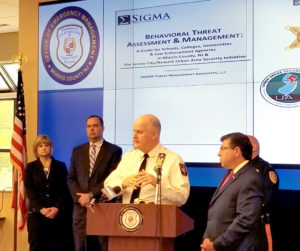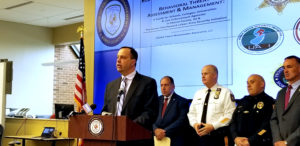Freeholders Support Asm. Bucco's School Violence Prevention Legislation
Published on May 23, 2019
Urge School Districts and Towns in Morris County to Formally Support Program Developed By Sheriff Gannon
The Morris County Board of Freeholders last night unanimously passed a resolution in strong support of legislation proposed by Assemblyman Anthony M. Bucco aimed at dealing with potential school violence.
The legislation focuses on the Responsible School Violence Prevention, Preparation and Protection Program that was developed in 2018 by Morris County Sheriff James M. Gannon in collaboration with the Morris County Police Chiefs Association.
 (JPG, 3MB) Sheriff Gannon outlines program, as Assemblyman Bucco stands at his side, at May 7 press conference
(JPG, 3MB) Sheriff Gannon outlines program, as Assemblyman Bucco stands at his side, at May 7 press conference
Recognizing the priority of keeping schools safe from violence and thwarting potential bloodshed in the pre-attack stage, the proposed legislation would mandate funding the necessary costs for scientifically-sound training for law enforcement, mental health professionals, teachers and other school staff and students to identify, assess and report behaviors that signal potential threats to school safety.
The legislation calls for funding a pilot RSVP-3 program specifically in the counties of Bergen, Essex, Hudson, Middlesex, Morris, Passaic and Union, and first class cities of Newark and Jersey City €“ all part of a designated federal Urban Area Security Initiative (UASI) zone.
"We strongly support this program as a model to curtail and prevent violence in our schools, to deal with key issues before violence occurs,'' said Freeholder Director Doug Cabana. "We are asking towns and school districts across our county, and statewide, to join us in getting this very important program established across New Jersey.''
Assemblyman Bucco and Sheriff Gannon outlined the legislation and detailed the program at the Morris County Board of Freeholders' work session in Morristown on Wednesday, and Sheriff Gannon also presented it at the freeholders' public meeting last night.
We all know that our most vulnerable populations are in our schools, said Sheriff Gannon. They're our children, they're our grandchildren. They're students. They're paraprofessionals. They're administrators and educators. They are people who keep the lights on in the schools and they're all near and dear to our hearts.
This RSVP-3 bill will, hopefully, enable us to prevent an incident from actually occurring, said Assemblyman Bucco, who co-authored legislation with his father, state Senator Tony Bucco, to allow Class III officers to serve in the state's schools.
 (JPG, 4MB) Morris County Law & Public Safety Director Scott DiGiralomo says assessing troubling behavior before it reaches a lethal level is a key component of the program
(JPG, 4MB) Morris County Law & Public Safety Director Scott DiGiralomo says assessing troubling behavior before it reaches a lethal level is a key component of the program
RSVP-3 was developed in Morris County in response to the Feb. 14, 2018, killings of 17 students and staff at the Marjory Stoneman Douglas High School in Parkland, Fla. With the focus on averting violence before tactical teams had to rush to schools, Sheriff Gannon and the Morris County Police Chiefs Association drew together mental health leaders, educators and law enforcement professionals.
The Morris County Board of Freeholders and UASI then each contributed $75,000, which was used to fund curriculum, authored by Sigma Threat Management Associates, on how school leaders, mental health experts and police should assess, evaluate and respond to threats to school safety.
Bucco's legislation, Assembly bill A-5242, was announced at a May 7 press conference featuring Assemblyman Bucco, Sheriff Gannon, Prosecutor Fredric M. Knapp; Morris County Police Chiefs Association President, Butler Police Chief Ciro Chimento; members of the Board of Freeholders, Morris County Law and Public Safety Director Scott DiGiralomo, and other law enforcement, education and mental health professional stakeholders.
DiGiralomo said police have plenty of trained officers and tactical equipment to respond to violence in schools should it erupt. But, he said, a plan for assessing behavior before it reaches a lethal level was missing before RSVP-3. Training, he said, typically focused on after the fact scenarios.
The part that was missing from our model is how do we prevent it. And RSVP-3 really fills that gap, DiGiralomo said. If we prevent that incident from ever happening, we don't have to implement all those other things we've trained with.